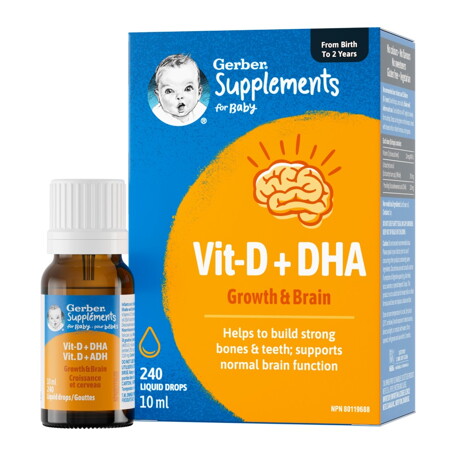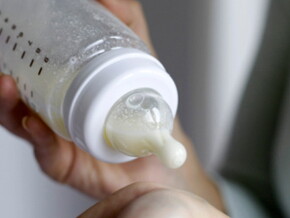
Baby Feeding and Nutrition Guide | How much formula is right for a newborn
It’s a common and important question for any parent or parent-to-be, and it’s never too early to start making decisions about baby nutrition. You can turn to this guide to help prep your infant feeding plan and find out valuable facts about baby nutrition. Constantly craving information? Add to the info below with guidance on first-year feeding from the Canadian Paediatric Society.
Breast milk is best
It’s the perfect food for a newborn baby in that it’s nutrient-rich,¤ it can change feeding by feeding to meet the nutritional needs of your baby as they grow, and it’s naturally produced to give your baby the best start in life.
Breastfeeding is great for you as well. It can help you return to your pre-pregnancy weight faster and help create an intimate bond between you and your baby.
Health Canada recommends that for the nutrition, immunologic protection, growth, and development of infants and toddlers, you breastfeed exclusively for the first six months, and you sustain it for up to two years or longer with appropriate complementary feeding.1,2
Learn more about the benefits of breastfeeding now.
Your infant feeding plan
How you feed your baby is a very personal decision. Here’s what you should consider while you personalize a baby nutrition plan:
- Base it on the right information, advice and support from your healthcare professional and your family.
- Know that breast milk is the ideal food for baby nutrition during the first six months of life.
- Look over the variety of infant formulas available, should you choose to introduce one.
As you get ready to give your baby all the nourishment they’ll need by developing an infant feeding plan, consider the following for yourself:
Suggested reading
1. Healthy Mom, healthy Baby
- Eat healthy (and enough. Newborns feed every 2-3 hours, you gotta eat, too).
- Hydrate.
- Get lots of rest.
- Call on family and friends for help around the house (or just let the chores wait).
- Keep “Canada’s Food Guide” handy
2. Learn about breastfeeding
Ready, set, breastfeed! Make it a fulfilling experience for both of you by arming yourself with helpful hints, as well as tips on how to cope with challenges.
3. Get right to it!
- Breastfeed ASAP after birth (within 30 to 60 minutes is recommended if you are healthy enough to do so).
- Hold your baby to skin-to-skin often to promote successful breastfeeding initiation.
- Confirm your hospital supports 24-hour rooming-in (so you never keep your hungry baby waiting).,
4. Know your supplementing options for optimum baby nutrition
- Your choices include breastfeeding, supplementing breast milk with infant formula, or feeding with infant formula only.
- Health Canada recommends cow milk-based commercial infant formula as the only safe and nutritious alternative to breast milk.1,2
- Canadian healthcare experts recommend commercial cow's-milk based infant formula as an alternative to breast milk from birth until 9 to 12 months of age.1
When can my baby have cow's milk?
Whole (3.25 percent) cow's milk isn't recommended as a part of a baby nutrition plan until the 9- to 12-month mark because it is low in iron and other nutrients.1
Iron should be part of a baby nutrition plan
As you strengthen your iron knowledge with the info below, know that your baby’s initial iron reserves may start to run low at about the 6-month mark1.
Why iron?
- It’s a vital nutrient that contributes to the normal growth and development of your baby.
- It’s essential in building red blood cells that transport oxygen throughout her little body.
How does a baby get iron?
- Healthy full- term infants are born with iron stores, which meet their needs until about six months of age.
- Your own iron-rich diet will help ensure that these stores stay topped up.
- Breast milk will provide your baby with adequate iron for those first 6 months1.
- Should you choose to supplement or exclusively formula feed, choose an iron-fortified formula.
- Introduce iron-rich solid foods after the 6-month mark1.
Wait, solid foods?
- Yep, your baby will be ready to start eating solid foods by around six months.
- The introduction of foods into a baby nutrition plan should be a steady progression of single ingredients and portion sizes between six and 12 months of age.
- Health Canada recommends baby’s first foods be iron-rich.1
- Healthy iron-rich options are meat, meat alternatives and iron-fortified baby cereal.
- Babies should be offered iron-rich foods two or more times a day.1,2
- Still not sure how to meet your baby’s iron needs once she’s accustomed to solid food? Just follow the baby nutrition recommendations in the chart below.3
Ironclad Reminders
- Breastfeeding is ideal ¾ and nature’s way of delivering iron to your baby for the first six months
- Always choose an iron-fortified infant formula if you decide to supplement or exclusively formula-feed
- Introduce iron-rich foods at around six months of age whether you're breastfeeding or formula feeding (just talk to your baby's doctor, first)
- Avoid whole cow's milk until at least nine to 12 months of age as it is a poor source of iron
- Be aware of the myths and know there is no scientific data that shows a correlation between iron-fortified formulas and gastrointestinal problems such as colic, constipation and fussiness
- Store all vitamin supplements that contain iron, including your prenatal and postpartum vitamins out of children's reach ¾ large amounts can be harmful to children
- If you suspect excessive iron intake, call your doctor or visit your local emergency room immediately.
Talk to your doctor about your baby’s iron needs and iron deficiency. Iron deficiency can cause your baby to be less active than usual, and perhaps even develop more slowly.
DHA
You’re probably aware of this fatty acid that offers health benefits: DHA (you know it as docosahexaenoic acid, right?) is an omega-3 fat.
What makes DHA so important to baby nutrition?
Experts agree that DHA is essential for healthy brain and eye development (they actually accumulate in the brain and eye tissue of your baby before birth).3
The earlier you can start getting DHA, a major brain-nourishing nutrient, the better—up to 90% of your baby’s brain growth will be complete by age three6.
How do I get them?
Your body will produce DHA from the essential omega-3 fatty acids: alpha-linolenic (ALA). It all starts though, with your healthy diet—so eat foods rich in DHA, like:
- Fatty fish: Atlantic salmon, herring, mackerel, sardines and cod are your best DHA bets (in that order).
- Omega-3 eggs fortified with DHA: A great substitute if you’re not a fish fan.
- Flaxseed and walnuts: Decent sources, yes, but you’ll only get a small amount of DHA once your body processes these.
How does my baby get DHA?
These nutrients are passed through your breast milk.
Your baby’s body produces them the same way yours does, from alpha-linoleic and linoleic acid that are added to all infant formulas. These essential fatty acids are also found in a variety of solid foods5. Plus, most infant formulas in Canada also contain DHA and ARA to support baby’s normal physical brain and eye development. Your healthcare professional can answer any more of your questions about DHA and ARA.
The Pros of Probiotics: Developing A Baby Nutrition Plan for Bolstering A Baby Immune System
Ah, yes, another miracle of nature—your baby’s developing immune system, it works hard as a:
- Shield from sickness and infection.
- Main support in her growth and overall health.
- Key in maintaining natural protective barriers.
The skin is obviously most important for protection, but another important barrier is the digestive tract, which is home to:
- 80% of the body's immune cells.7
- The gut flora, a delicately balanced community of around 500 different kinds of bacteria.
In a healthy digestive system, part of the task of keeping baby’s immune system and body safe from illness relies on good bacteria (or bacterial cultures)—they can also help to balance potentially harmful bacteria. One way to help support this protective barrier is to increase the levels of good bacteria in your baby’s digestive tract.
Recent research has shown that breast milk naturally contains protective factors, including:
- Probiotics, like bifidobacteria that:
- Are good bacteria
- Make up to 90% of the naturally occurring bacteria found in the gut flora of healthy, breastfed babies.10
- Aid in building a healthy digestive tract flora.
- Help with the healthy development of a strong immune system.11,12
- Human Milk Oligosaccharides (HMOs), like 2’-FL, that:
- Are bioactive compounds found in breast milk that offer protective benefits for your baby.
- Support your little one’s digestive health and developing immune system.
- Help ‘friendly’ bacteria grow and protect against ‘unfriendly’ bacteria and viruses.
These facts alone make it easy to see why breast milk is an ideal source of probiotics and HMOs for your baby.

Gerber Baby Supplements: VitD + DHA Liquid Drops - Essential Support for Your Baby's Growth and Development
Our new line of Gerber® Supplements for Baby features specially formulated Vitamin D drops for babies including DHA to help build strong bones and teeth and support normal brain function in infants.
From birth to 2 years
References:
1Joint statement of Health Canada, Canadian Paediatric Society, Dietitians of Canada, and Breastfeeding Committee for Canada. Nutrition for Healthy Term Infants: Recommendations from Birth to Six Months. 2012. https://www.canada.ca/en/health-canada/services/canada-food-guide/resources/infant-feeding/nutrition-healthy-term-infants-recommendations-birth-six-months.html
2Health Canada. Canada’s Food Guide. https://food-guide.canada.ca/en/
3Joint statement of Health Canada, Canadian Paediatric Society, Dietitians of Canada, and Breastfeeding Committee for Canada. Nutrition for Healthy Term Infants: Recommendations from Six to 24 Months. 2014. https://www.canada.ca/en/health-canada/services/canada-food-guide/resources/infant-feeding/nutrition-healthy-term-infants-recommendations-birth-six-months/6-24-months.html
4ADA/DC. J Am Diet Assoc. 2007; 107:1599-1611.
5Li J, et al. Food Sci Nutr. 2021;9(9):5229-5243.
6Saavedra, JM. Nutr Clin Pract . 2007;22(3): 351-365.
7Gueimonde M, et al. Neonatology. 2007;92:64-66.
8Holscher HD, et al. J Parenter Enteral Nutr . 2012;36:106S-117S.
9Bode L, et al. Glycobiology. 2012;22(2):1147-1162.
10Goehring K, et al. PLoS One. 2016;146(12):2559-2566.
11Storm H, et al. Global Pediatric Health. 2019;6:1-10.
12Health Canada. Accepted Claims about the Nature of Probiotic Micro-organisms in Food. April, 2009. https://www.canada.ca/en/health-canada/services/food-nutrition/food-labelling/health-claims/accepted-claims-about-nature-probiotic-microorganisms-food.html.






















